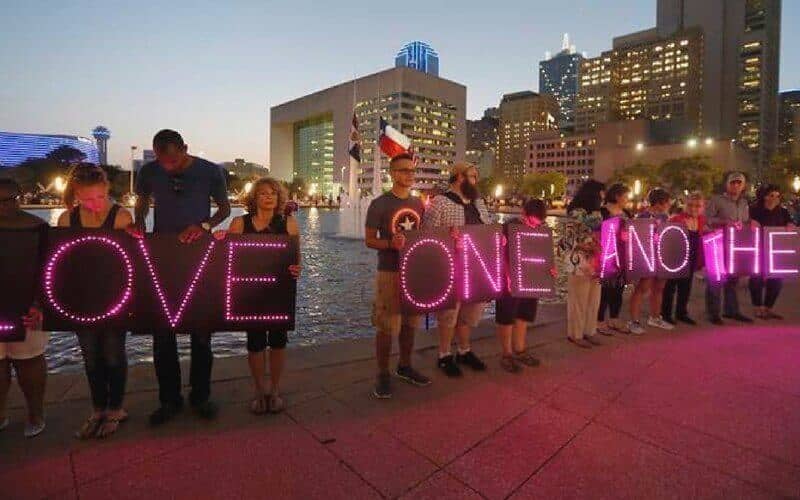CNN Asks ‘Who Can Heal America?’ The Hymn-Writer’s Response…
Two days after a disturbed former soldier executed five Dallas police officers in retaliation for the deaths of two black men at the hands of white cops, I opened my laptop to this CNN.com home page headline: “Who Can Heal America?”
Who can heal America?
It’s the sort of fundamental question you don’t often see in the mainstream media—a plea for help, fueled by fear and desperation. In the piece that follows, CNN reporter Stephen Collinson captures the harsh and hopeless reality of this moment in history: “Despite all the calls for unity, the prayers offered and the platitudes voiced, there are few signs yet that any candidate, lawmaker, law enforcement leader, or civil rights campaigner has mustered the trust and respect of voters needed to knit a mournful nation together and freshen the stale national debate on race and violence.”
Collinson’s assessment rings true—when we look around the landscape of our fractured, reactive, and violent culture, we don’t see anyone who has the weight to “knit a mournful nation together”…
And then, yesterday, I was sitting in church as our African-American worship pastor led a mostly white, suburban congregation through the normal litany of praise songs. But at the end of that string he did something profoundly different, and it caught me off guard. He lowered his guitar and paused, then launched into a raw accounting of the grief and horror and fear we all feel in this moment. This was his on-ramp into the last worship song of the morning: “The Battle Hymn of the Republic.”
An old hymn with a new message of hope for today
“This song,” he explained, “was written more than 150 years ago during a time of great racial strife in the U.S.—the Civil War. The violence fueled by racial division during this time is still the worst in American history. And in the midst of this wrenching moment in our journey, Julia Ward Howe writes a song of conviction and hope that helps redirect the nation’s focus.”
And then he led his worship band into the song, starting with the rat-a-tat-tat marching rhythm of the snare drum. Of course, this song is best known for its crescendo—the “Glory, glory hallelujah” chorus. But a lyric in the first stanza of the song, a phrase that’s always been something of a mystery to me, now surfaced in clarity: “He is trampling out the vintage where the grapes of wrath are stored.”
For all of my life, I’d jumped over this lyric like it was a mud puddle—its oblique phrasing and semi-cryptic message is both familiar and foreign to me. But this time I did something I’ve never done; I stopped to ask Jesus to unravel its meaning for me. And then it came to me: Howe, a ghost voice from our dark past, is offering us an answer to “Who Can Heal America?” She is capturing the relentless heart of God in the face of the relentless advance of hatred. Our “storehouse” of wrath is overflowing right now, but He makes vintage-quality wine out of those terrible “grapes.” Jesus will make beauty out of ugly, no matter how much ugly we throw at him. And he is, right now, stomping on those grapes, preparing them for his latest vintage.
Jesus will make beauty out of ugly
We get an early taste of that wine in the tears of gratitude on the face of an African-American mom as she describes how white officers surrounded her during the Dallas shooting, forming a wall of protection as she lay wounded on the ground. We taste it in the sea of sticky notes plastered to the walls of an urban Denver AME church by white neighbors pledging their love and support for a black congregation. And we taste it at the Potter’s House Church in Dallas, when a news photographer captures a white man with a Marine haircut reaching across the gap between pews to hold hands with an African-American woman as the congregation prays.
Who can heal America? Only Jesus can heal America… And it’s time to turn our attention, again, from the false prophets and false saviors we’ve looked to for help, and abandon ourselves to Jesus instead. The Psalmist frames it well: “I look up to the mountains—does my help come from there? My help comes from the Lord, who made heaven and earth!” (Psalm 121:1-2). Jesus is not pointing to our only hope; he is, himself, our only hope.
Note: It’s a perfect time to revisit my race-and-reconciliation conversation with Efrem Smith, CEO of World Impact, an urban missions organization that empowers the urban poor through church-planting movements and leadership development. Read it here.
This article first appeared on YouthMinistry.com.






